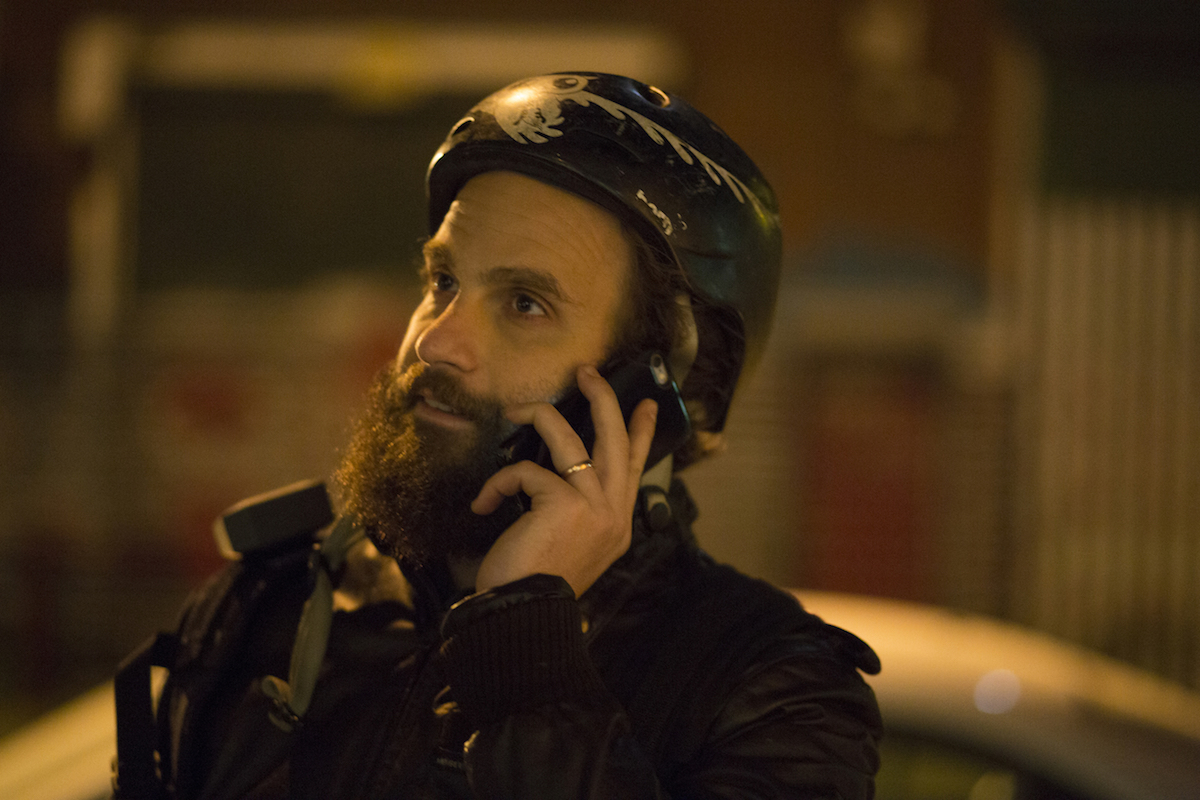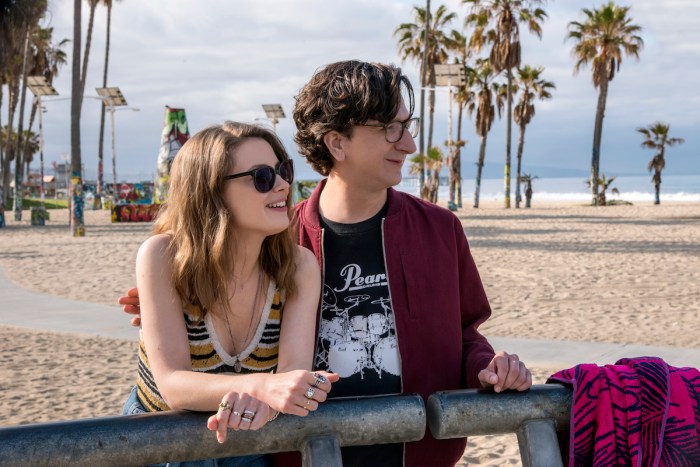The average weed smoking New Yorker probably doesn’t know much about their dealer.
“High Maintenance”may revolve around a nameless pot delivery guy (played by co-creator Ben Sinclair) who bikes product all around the city — but it’s not really his story. “The Guy,” as he’s referred to, is merely the pot (and plot) connection between the diverse cast of characters, who vary from episode to episode:a cross-dressing stay-at-home-dad with writer’s block; a homeless twenty-something who charms her way into extended stays with OkCupid dates; a diffident, middle-aged woman with a penchant for birdwatching, newly diagnosed with cancer. What do they all have in common? They’re stressed out, lonely New Yorkers who need something to help get them out of their heads.
The series’ co-creators and writers,Ben Sinclair, 32, and Katja Blichfeld, 37, who are married and live in Brooklyn, know the feeling well. “I mean, we’re not happy hour people,” says Sinclair. “In a place that’s so aspirational, so competitive, what attracts us to the pot mechanism is an active step people are trying to take to make themselves less anxious.” When the two debuted the show in 2012 as a scrappy, DIY web series on Vimeo, it quickly garnered a cult following and attention from the likes of designer Rachel Comey and comedian Hannibal Buress, who starred in past episodes. A couple years later, Vimeo funded a new season as part of its foray into original programming. And now, Blichfeld and Sinclair have made their way to HBO, where a brand new six-episode season airs Friday at 11pm.
Why did you want to make a show about a weed delivery guy?
Sinclair: Just because of the time it takes to buy weed was about the time we thought people would want to watch a video online. We were like, five minutes, that’s a good amount of time to tell a story from beginning to middle to end of an interaction. Also, because we didn’t have a dedicated apartment to shoot in, we could move apartments. We didn’t have dedicated actors because we didn’t have any money to pay them, so we could move the clients through. There were a whole host of reasons why it worked out well. As co-writers of the show, what is your writing process like? We read that you sometimes write together in the shower on a waterproof notebook.
Sinclair: That is a cute answer we came up with. Last year we were always working. If we have something that comes, we try to write it down. We tried to separate work and our relationship, as much as we could, but it was really tough to do last year, because we were always applying everything that was happening to us through the filter of this f—ing show. Yeah, it must be pretty challenging to be married to the person you work with.
Blichfeld: We do everything together. It was to the point where we couldn’t even tell each other a new thing because we were having all the same experiences. So we couldn’t even come back and tell each other, “Oh I met this new person, they told me this crazy story,” because it would be like, “I know, I was with you for that crazy story.” There was a year in general since we got out of shooting that we were like, we need to step away from this project so we can come tell each other interesting things. Sinclair: The recognition that we are two different people, this year, was really big for us.
Blichfeld: Oh, we’re not fused as one entity? Two-headed being?
Other contemporary New York-based shows, like “Girls,” have gotten flack for their lack of diversity — for representing too narrow a demographic. It’s a triumph of “High Maintenance” that you include characters from all walks of life. Was that something that was important to you? Blichfeld: We just want to reflect back what we see. Before, it was like, let’s use what we have, which was these liberal arts college-educated friends around us. And then we kind of maxed that out, so we were like, “OK, now how do we make this show better? Let’s make it even more representative of what we see.” Then the next challenge was, how do we do that without being reductive, without essentializing. And then we just went from there.
Sinclair: I think we would say, like, this could happen, and then, say, for example, ask an actress we were about to work with, “This happened to us. What would it look like if it happened to you in your family? Talk us through this.” We had done that once but that’s not the way we always do it. It’s really just putting different people’s skins on our emotions, so it feels like it’s all coming from one place, for us, but it is very heartening to hear [otherwise]. Because, we don’t live in a vacuum. We hear those critiques about those other shows. Are you guys watching anything right now that’s been particularly influential?
Sinclair: The first episode of “The Night Of” like, ruined me. That was the best portrayal of New York that I have seen in a long time. That was like NEW YORK.
Blichfeld: It felt sooo New York. Blew us out of the water. Blew my mind. We also love “Transparent.”
Sinclair: We can’t wait for that to come back.
Weed and the City

Craig Blankenhorn/HBO
















